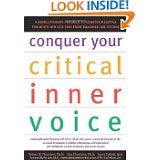Why We Don’t See Ourselves Clearly
 On any given day of our lives, our self-esteem is likely to hit plenty of peaks and valleys. One minute, we may feel confident and content, the next we may feel insecure and uneasy. As unsettling as this can be, it’s not uncommon. Our self-perception is often not based on what’s actually going on in our lives, but rather on a negative internal distortion known as our “critical inner voice.”
On any given day of our lives, our self-esteem is likely to hit plenty of peaks and valleys. One minute, we may feel confident and content, the next we may feel insecure and uneasy. As unsettling as this can be, it’s not uncommon. Our self-perception is often not based on what’s actually going on in our lives, but rather on a negative internal distortion known as our “critical inner voice.”
The critical inner voice is a well-integrated pattern of negative thoughts toward ourselves and others. In addition to casting a shadow on our sense of self, this internal enemy is often at the root of our maladaptive behavior. We experience this “voice,” not as an auditory hallucination, but as a series of questioning, critical, and self-limiting thoughts and attitudes that pop up throughout our day.
To understand the workings of this voice, it’s helpful to first look at its origins. Our inner critic is shaped from early life experiences that are internalized and influence our sense of identity. Just as positive experiences of love, warmth, and security help shape our positive sense of self, negative life experiences inform our inner critic. In an attempt to make sense of painful or hurtful experiences, our minds draw conclusions about who we are and how people will perceive us.
Hurtful attitudes we pick up from our parents or primary caretakers as well as painful interactions with peers, siblings, or influential adults can all help shape our critical inner voice. A rejecting or dismissive parent may leave us feeling unimportant or like a burden. An intrusive and judgmental parent may make us feel like we are full of flaws and simply not good enough.
As adults, we may go on to live independent lives, but we’ve absorbed these attitudes and carry them with us, kind of like critical parents in our heads. The tricky part about this process is that we rarely identify these thoughts as outside forces coloring our realistic point of view. Instead, we see our critical inner voice AS our real point of view.
So, how does this voice affect us in our present lives? Our critical inner voice is tricky, because not only does it fill our heads with self-doubt, spiteful commentary, and scathing assessments of everything from how we look to how we behave, from who we are to what we deserve, but it can also seem almost self-soothing. For instance, if we’re thinking about whether to go out for the night, and we happen to catch a glimpse of ourselves in the mirror, a voice attack may creep in with commentary like, “You look terrible. Why even bother getting dressed up?” As we hop in the shower, it may start in with, “What’s the point of going out? You’re so awkward socially.” The minute we’re about to get dressed, that same voice may change its tune. “You don’t need to go out, you know? You could just stay in and watch that show you like. Have a glass of wine and relax. Going out will make you feel bad anyway.”
The voice can quickly switch from being harsh and critical to soft and soothing in tone. However, the result is the same. The minute we give in, and decide to stay home, for example, the voice gets stronger. “You’re such a loser. Home on a Friday night again. You’ll always be alone.” It’s helpful to remember, the voice is never actually on our side. Rather, it’s designed to reconfirm existing negative beliefs we hold about ourselves, i.e. “you’re ugly, awkward, unpopular, etc”
The other confusing aspect of our critical inner voice is that we distort ourselves in both directions. Because our self-image feels fragile at the whim of this sadistic thought process, we have a tendency to both put ourselves down and defend ourselves. For example, if our partner tells us something that bothers them about how we acted or a boss gives us constructive criticism, we may feel exaggeratedly threatened and become defensive. The minute we feel attacked, we may argue like our entire self-image depends on it, because our inner critic makes us feel like it does.
We are often especially sensitive to criticism that gels with the pre-existing critical inner voices we have about ourselves. This may sound counter-intuitive, because it may seem like we’d simply agree with such criticism. However, in truth, when we’re already feeling so vulnerable and insecure about one aspect of ourselves, people seemingly confirming this negative self-concept feels quite stinging. We may be hyper-aware and critical toward ourselves, but we’re also pretty defensive about admitting any shortcomings.
We feel like we can’t handle any outside criticism or feedback, because our critical inner voice gets ahold of these statements and turns them into attacks. The same filter that filters out positive acknowledgment also exaggerates the negative, making it devastating. This pained reaction (or over-reaction) is often a result of the emotions or memories of emotions being stirred up of the circumstances that created the critical inner voice in the first place. For instance, going back to the example of a parent ignoring or rejecting our needs, we may be especially sensitive to people who perceive us as being demanding in any way. Because the emotions being stirred are so deeply tied to our past, we often feel overly fearful of specific feedback. We may even exaggerate or misinterpret what a partner, friend, coworker, etc. is saying to make it fit with an old, hurtful sense of identity.
Of course, this process is largely unconscious. We aren’t aware of the primal feelings being triggered any more than we’re aware of the critical inner voice starting to chime in inside our heads. Instead, we’re off to the races defending ourselves, attacking the other person, then perhaps, attacking ourselves again. Our critical inner voice can perpetuate a pretty vicious cycle, but the good news is, it is a cycle we can break.
The first way to do this is to embrace compassion. Self-compassion, unlike self-esteem, focuses on being kind to ourselves rather than evaluating our worth. This kindness includes being mindful of the fact that we are often listening to a mean, internal coach that does not serve us. To overcome this inner critic, we must identify when it arises, understand where it comes from, separate out and strengthen our real point of view, and finally, challenge the behavior it perpetuates. As we do this, we need self-compassion.
According to self-compassion researcher Dr. Kristin Neff, self-compassion involves “being open to and moved by one’s own suffering, experiencing feelings of caring and kindness toward oneself, taking an understanding, nonjudgmental attitude toward one’s inadequacies and failures, and recognizing that one’s experience is part of the common human experience.” Self-compassion allows us to meet our inner critic with empathy. It allows us to extend this empathy to others, who are also living largely at the whim of their critical inner voice. Shedding the overlays of this inner critic and embracing self-compassion are at the heart of truly knowing ourselves and of becoming who we want to be.
Tags: critical inner voice, distorted self-image, hate myself, inner critic, inner voice, insecure, self attacks, self-compassion, self-esteem, self-hatred, self-image, self-perception, sense of self, why do I hate myself6 Comments
Comments are closed.









so helpful
Purchased fantasy bond online. I can’t figure out how to open it
I have forwarded your request to someone who can assist you. They should be in contact with you shortly.
Thank you so much, very helpful
self compassion isn’t for failures
I really needed this. Some very useful information!